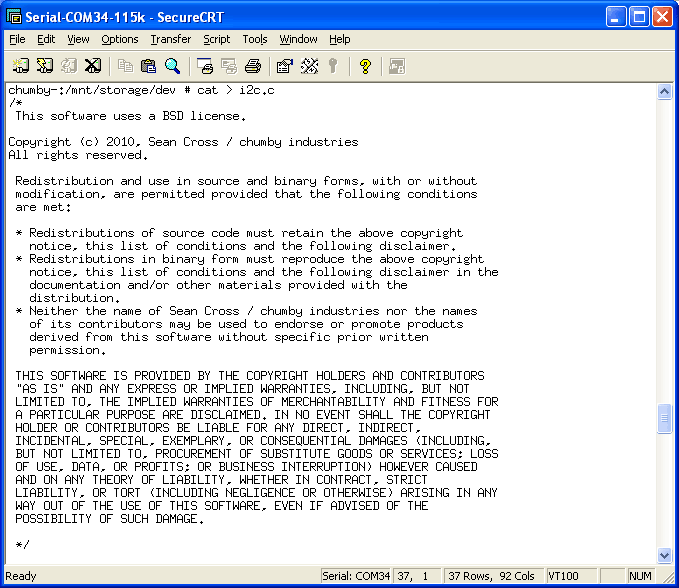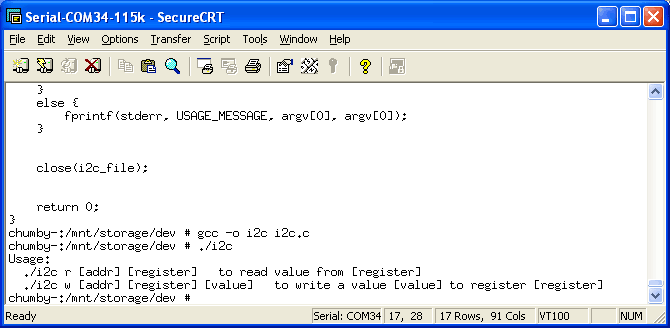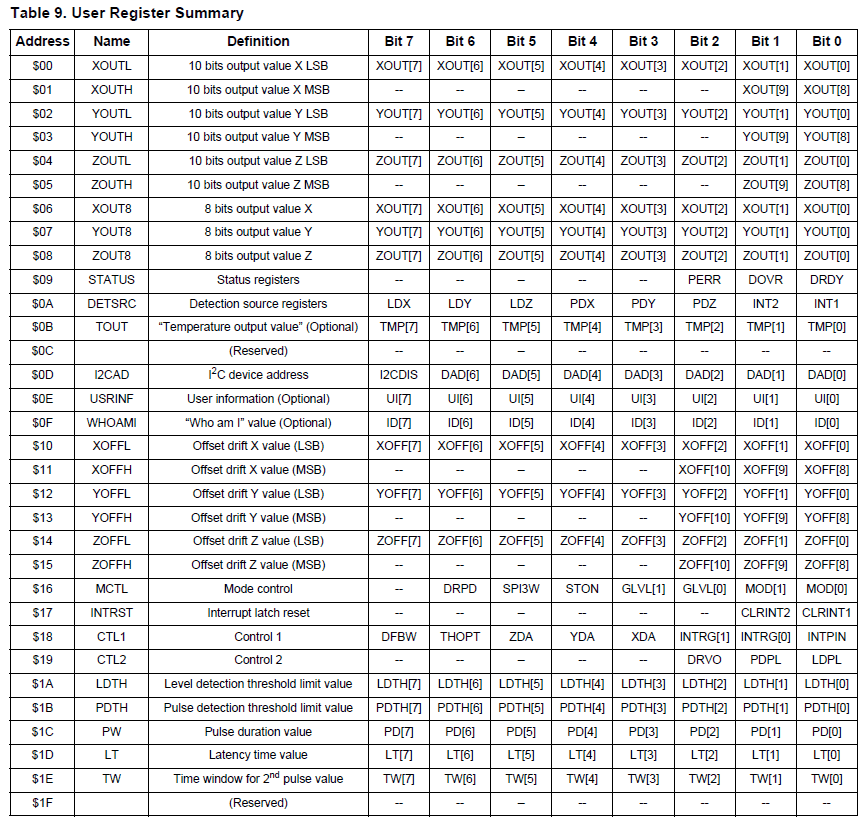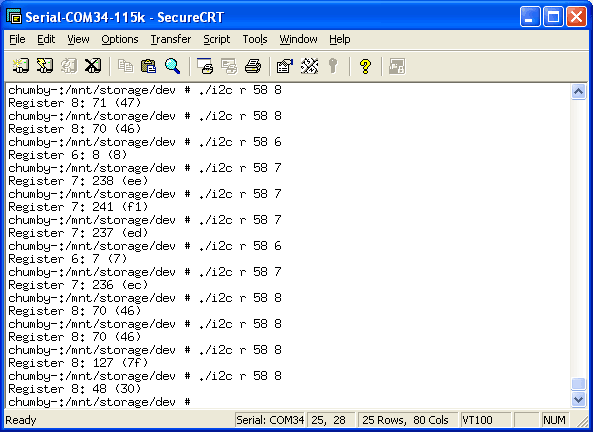This is an old revision of the document!
Table of Contents
THIS TUTORIAL IS STILL IN PROGRESS
i2c twiddler
First, you'll need to have a toolchain installed so make sure you go back and install it!
Sean Cross wrote a great i2c twiddler-tool. This allows you to poke and peek at i2c chips right from the command line. Nice!
Scroll down and copy his i2c C code. Open up your terminal to the CHB and type in mkdir /mnt/storage/dev (or whatever place you want to store your code), then cd /mnt/storage/dev and finally cat > i2c.c into the terminal and hit return. Then paste in the code and finish by typing Control-D
Then compile the code with gcc by typing in gcc -o i2c i2c.c to create the i2c executable. Then run it and make sure you get the response below
Reading the MMA7455L accelerometer
There's a Freescale +-2G to +-8G 3-access accelerometer on the CHB for you to play with, lets get some readings. First off, we need to know what the i2c address is. Open up the datasheet and look for the section called "i2c Slave Address"
$1D means hexadecimal 0x1D which is the same as decimal 29. Great! Lets read byte #0 from the accelerometer by typing in ./i2c r 58 0
?? We got an error that the register was not readable. This means the chip could not be found on the i2c bus. :( But then we rememer that i2c addresses are 7 bits long and are transmitted in the upper bits of an 8-bit byte. So we actually need to shift the address up by 1 bit. That's easy to do, though, just multiply by 2 to get i2c address 58
Rock! Now we need to figure out what registers we can read, looking at the datasheet we see:
There's a lot of stuff! Lets start with one we know is going to work, like $0D (hex 0x0D = dec 13)
It in fact returns the value 0x1D which we know is the i2c address
Acceleromate!
OK so now we want to get that XYZ data, right? Looking at the register file it seems like the first 6 bytes are used for 10-bit readings, but we can get single 8 bit readings from registers number 6, 7 and 8
If you're careful you can read those registers while having a friend gently shake the board, you'll see different values returned
However, wouldn't it be great if you didn't need a friend to shake the board while you pressed Up-arrow & Return?
Code
/*
This software uses a BSD license.
Copyright (c) 2010, Sean Cross / chumby industries
All rights reserved.
Redistribution and use in source and binary forms, with or without
modification, are permitted provided that the following conditions
are met:
* Redistributions of source code must retain the above copyright
notice, this list of conditions and the following disclaimer.
* Redistributions in binary form must reproduce the above copyright
notice, this list of conditions and the following disclaimer in the
documentation and/or other materials provided with the
distribution.
* Neither the name of Sean Cross / chumby industries nor the names
of its contributors may be used to endorse or promote products
derived from this software without specific prior written
permission.
THIS SOFTWARE IS PROVIDED BY THE COPYRIGHT HOLDERS AND CONTRIBUTORS
"AS IS" AND ANY EXPRESS OR IMPLIED WARRANTIES, INCLUDING, BUT NOT
LIMITED TO, THE IMPLIED WARRANTIES OF MERCHANTABILITY AND FITNESS FOR
A PARTICULAR PURPOSE ARE DISCLAIMED. IN NO EVENT SHALL THE COPYRIGHT
HOLDER OR CONTRIBUTORS BE LIABLE FOR ANY DIRECT, INDIRECT,
INCIDENTAL, SPECIAL, EXEMPLARY, OR CONSEQUENTIAL DAMAGES (INCLUDING,
BUT NOT LIMITED TO, PROCUREMENT OF SUBSTITUTE GOODS OR SERVICES; LOSS
OF USE, DATA, OR PROFITS; OR BUSINESS INTERRUPTION) HOWEVER CAUSED
AND ON ANY THEORY OF LIABILITY, WHETHER IN CONTRACT, STRICT
LIABILITY, OR TORT (INCLUDING NEGLIGENCE OR OTHERWISE) ARISING IN ANY
WAY OUT OF THE USE OF THIS SOFTWARE, EVEN IF ADVISED OF THE
POSSIBILITY OF SUCH DAMAGE.
*/
#include <stdio.h>
#include <linux/i2c.h>
#include <linux/i2c-dev.h>
#include <fcntl.h>
#include <stdlib.h>
#include <unistd.h>
#include <sys/ioctl.h>
#include <string.h>
#define I2C_FILE_NAME "/dev/i2c-0"
#define USAGE_MESSAGE \
"Usage:\n" \
" %s r [addr] [register] " \
"to read value from [register]\n" \
" %s w [addr] [register] [value] " \
"to write a value [value] to register [register]\n" \
""
static int set_i2c_register(int file,
unsigned char addr,
unsigned char reg,
unsigned char value) {
unsigned char outbuf[2];
struct i2c_rdwr_ioctl_data packets;
struct i2c_msg messages[1];
messages[0].addr = addr;
messages[0].flags = 0;
messages[0].len = sizeof(outbuf);
messages[0].buf = outbuf;
/* The first byte indicates which register we'll write */
outbuf[0] = reg;
/*
* The second byte indicates the value to write. Note that for many
* devices, we can write multiple, sequential registers at once by
* simply making outbuf bigger.
*/
outbuf[1] = value;
/* Transfer the i2c packets to the kernel and verify it worked */
packets.msgs = messages;
packets.nmsgs = 1;
if(ioctl(file, I2C_RDWR, &packets) < 0) {
perror("Unable to send data");
return 1;
}
return 0;
}
static int get_i2c_register(int file,
unsigned char addr,
unsigned char reg,
unsigned char *val) {
unsigned char inbuf, outbuf;
struct i2c_rdwr_ioctl_data packets;
struct i2c_msg messages[2];
/*
* In order to read a register, we first do a "dummy write" by writing
* 0 bytes to the register we want to read from. This is similar to
* the packet in set_i2c_register, except it's 1 byte rather than 2.
*/
outbuf = reg;
messages[0].addr = addr;
messages[0].flags = 0;
messages[0].len = sizeof(outbuf);
messages[0].buf = &outbuf;
/* The data will get returned in this structure */
messages[1].addr = addr;
messages[1].flags = I2C_M_RD/* | I2C_M_NOSTART*/;
messages[1].len = sizeof(inbuf);
messages[1].buf = &inbuf;
/* Send the request to the kernel and get the result back */
packets.msgs = messages;
packets.nmsgs = 2;
if(ioctl(file, I2C_RDWR, &packets) < 0) {
perror("Unable to send data");
return 1;
}
*val = inbuf;
return 0;
}
int main(int argc, char **argv) {
int i2c_file;
// Open a connection to the I2C userspace control file.
if ((i2c_file = open(I2C_FILE_NAME, O_RDWR)) < 0) {
perror("Unable to open i2c control file");
exit(1);
}
if(argc > 3 && !strcmp(argv[1], "r")) {
int addr = strtol(argv[2], NULL, 0);
int reg = strtol(argv[3], NULL, 0);
unsigned char value;
if(get_i2c_register(i2c_file, addr, reg, &value)) {
printf("Unable to get register!\n");
}
else {
printf("Register %d: %d (%x)\n", reg, (int)value, (int)value);
}
}
else if(argc > 4 && !strcmp(argv[1], "w")) {
int addr = strtol(argv[2], NULL, 0);
int reg = strtol(argv[3], NULL, 0);
int value = strtol(argv[4], NULL, 0);
if(set_i2c_register(i2c_file, addr, reg, value)) {
printf("Unable to get register!\n");
}
else {
printf("Set register %x: %d (%x)\n", reg, value, value);
}
}
else {
fprintf(stderr, USAGE_MESSAGE, argv[0], argv[0]);
}
close(i2c_file);
return 0;
}









